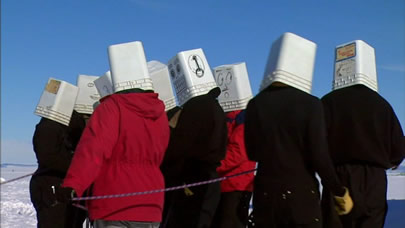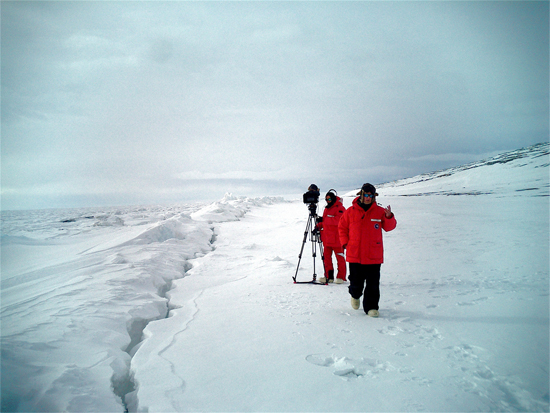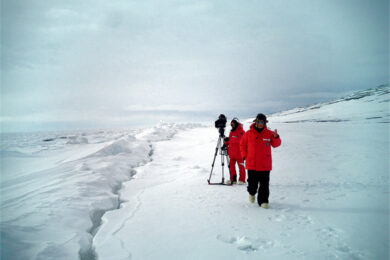In one of his recent routines, Stewart Lee pointed out that March of the Penguins did such a roaring good trade in America because the religious community promoted it as a covertly moral film. Penguins are, of course, fiercely monogamous and go through great trials to procreate and protect their cuddly fluffy brood. The message being that nature (read ‘God’) wants you to be good and monogamous — it promotes family values. This is, of course, a massive distortion: monogamy is the exception not the rule in nature. So Lee proposed an alternative film — a documentary about the platypus, the only animal in nature that reproduces solely through homosexual gang rape. Lee is still looking for investors. . . .
Such a film does not exist, though the likes David Attenborough do not flinch at the darker side of the natural world. The closest thing to a decidedly anti-March of the Penguins documentary is probably Herzog’s 2005 doc Grizzly Man about the ill-fated adventures of bear-hugger Timothy Treadwell. Treadwell seemed to treat his life like a Disney film (which he was the director of) and his furry companions like over-sized house cats. He was ultimately eaten by that which he loved most — a better tragedy couldn’t have been written. In Herzog’s eyes, nature is not so much evil as simply indifferent. The irony of the phrasing of the environmental mantra "save the earth" is that the earth will always be fine — nature doesn’t give a shit about us, what is at stake is our ability to exist on the earth. Our efforts to make sense of nature or project our ideals onto it are futile, despite the fact that we seem inclined as a race to constantly do so.
Encounters at the End of the World is a much looser and much, much funnier film which builds on the ideas about nature which have been a part of Herzog’s films from the beginning. His challenge, stated from the very onset, was to make a documentary in Antarctica which wasn’t about "fluffy penguins". Instead, the human inhabitants of the frozen continent become the target of Herzog’s inquisitive gaze. They are treated not as experts but as curiosities themselves. These people, who in one way or another have chosen to leave normal society behind and live at the end of the world, are just as intriguing and bizarre to most of us as any penguin ritual. It is an anthropology of the Treadwell, Aguirre or Fitzcarraldo kind of madness which drives people to attempt to conquer nature.
Besides the obligatory quirky scientists, Herzog interviews amateur philosophers, descendants of Aztec kings, misanthropes and escape artists — all of whom are eager to tell the story of how they got there. When asked, one young linguist explains "everyone who’s not tied down in the world falls to the bottom." This linguist had once been cataloguing obscure tribal languages which are disappearing at a rate you’re more likely to associate with deforestation. Herzog asks why we are more concerned with preserving nature than preserving human knowledge.
Despite the high science content, this is not the kind of IMAX science film that marvels at human progress and mastery of nature to a classical score; nor is it a Richard Dawkins-style attempt to elevate science to, ironically, religious proportions. The film instead highlights the limits of our understanding. These men and women may be at the frontier of human knowlege, but they’re not going anywhere particularly fast. Each scientist, with their minute specialisation, has a Sisyphean task ahead of them; their little foothold in the unknown seems almost nothing.

In the film, nature is not depicted as beautiful, benign and elegant but as vast, messy and utterly unfathomable. Herzog’s nature shots can only be described as sublime (in the Edmund Burke sense of being simultaneously beautiful and terrifying). The shots from under the ice — an environment called "the cathedral" by the divers who work in it — are particularly overwhelming.
Herzog starts the film with some seemingly unrelated questions about what separates us from animals (illustrated, hilariously, with a drawing of a monkey riding bare-back on a horse). If animals use tools, and do ‘evil’ things and perform complex rituals, as we do, then what makes us so special? Although he approaches his subject matter with earnestness, he’s keen to challenge this distinction whenever possible. For instance, he introduces us to a scientist who shows us a microscopic creature that builds small tree-like structures by selecting from the debris around it — a feat which fulfills most standard definitions of ‘intelligence’ we have devised.
In another scene, Herzog is bored to tears talking to a penguin expert so he asks the seemingly flippant question, "Can a penguin go insane?" Yet the very next scene we see just that — out of a swarm of penguins heading to the mating grounds a lone dissenter makes make a sharp right and head towards the mountains in a full-speed waddle. It’s explained that this penguin has become confused and will head for that mountain with the same vigour with which he pursued the promise of procreation, until he reaches his goal or dies. Isn’t insanity a human trait? Near the end, while exploring some tunnels under the south pole, Herzog wonders what an alien race would think of the relics of our civilization and how they would imagine us to be. Who knows what an alien race would have thought of the deeply funny snow-blindness training sequence featuring people with cartoon-faced buckets on their heads leading each other around — literally the blind leading the blind.
While the editing frequently plays up the absurdity and the human comedy of certain scenes, and Herzog’s narration frequently interrupts an interviewee’s long-winded anecdote to say "the story went on and on", Encounters seems to confirm that Herzog has no ill-will to people like Treadwell or these lost Antarctic souls. The laughs come out of understanding — perhaps Herzog of all people sees a bit of their hubris and childlike wonder in himself. His views are anti-humanist but certainly not anti-human. Any mean-spirited laughs more likely come from us, the audience, as we nervously see ourselves, in our lives, doing our own pointless tasks in the wilderness.
The lesson, if there is one, is that these residents of the bottom of the world are just extreme examples of the human condition: in which we pretend we are separate from and somehow above nature. All of our human achievements and attempts to find collective meaning in the world are ultimately futile and will soon be forgotten; Encounters makes you feel small but not alone in this predicament. In a way, the insane penguin is the perfect symbol of humans in general. We are no more than a race of demented penguins, boldly opposing the natural order, barrelling full speed into the void.



